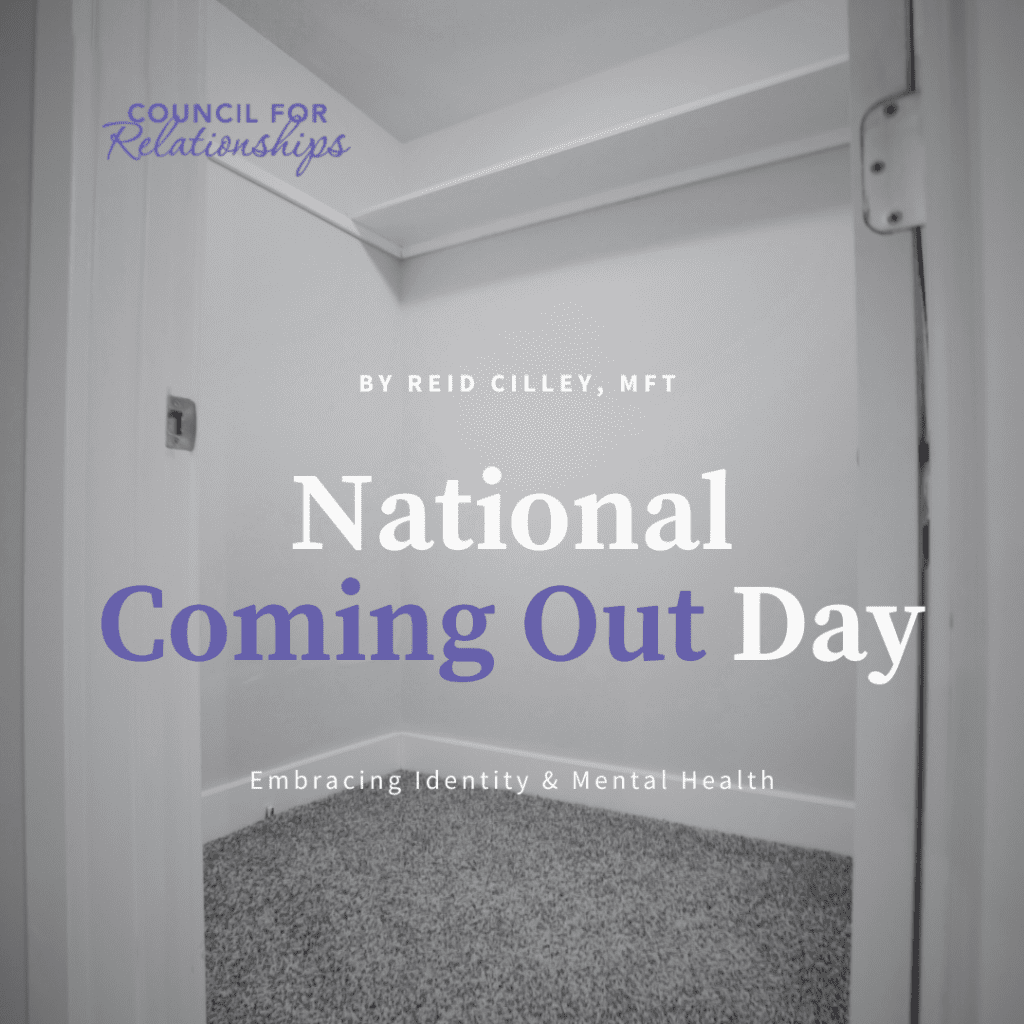National Coming Out Day: Embracing Identity & Mental Health
Each year, National Coming Out Day reminds the LGBTQ+ community and allies to honor the courage of coming out. Founded on the belief that sharing one’s true self leads to self-acceptance and positive change, this day celebrates those who openly embrace their identities and honors those who have paved the way for today’s freedoms.
Council for Relationships therapist Reid Cilley, MFT, shares insights on the coming-out process, exploring the emotions, challenges, and support systems that guide LGBTQ+ individuals through this journey.
Understanding National Coming Out Day: History and Purpose
National Coming Out Day began on October 11, 1988, and was created by activists Robert Eichberg and Jean O’Leary to inspire LGBTQ+ individuals to share their sexual orientation and gender identities openly. This day commemorates the 1987 National March on Washington for Lesbian and Gay Rights, a pivotal event in the civil rights movement. The day promotes visibility, community, and pride, encouraging people to embrace their unique identities and recognize the shared strength within the LGBTQ+ community.
Today, National Coming Out Day reminds LGBTQ+ individuals and allies of the courage it takes to live openly while encouraging others to foster supportive and inclusive environments. Organizations such as the National Coming Out Project provide resources and guides to help people on their coming out journey.
What Exactly is Coming Out?
“Coming out” describes the act of sharing one’s LGBTQ+ identity with others, whether family, friends, or society. For many, coming out becomes a crucial step toward self-acceptance and personal growth. It involves understanding one’s identity and deciding when and how to share it with others. This decision is personal, with each individual finding the right time and method.
Respecting this process on National Coming Out Day and beyond helps create an atmosphere where people feel comfortable expressing their true selves.
Emotions and Empowerment in the Coming Out Process
The coming-out journey often brings feelings of empowerment as people embrace a more authentic life. This process can create relief and a sense of belonging, yet it may also bring anxiety, uncertainty, or fear of rejection.
These mixed emotions are natural, and it’s okay to experience both excitement and apprehension on National Coming Out Day or any time one considers coming out. Creating safe, supportive environments can help individuals feel comfortable in their journey.
Living Authentically in Everyday Life
Being true to oneself lies at the core of the coming-out journey. Living authentically means honestly representing one’s identity, which can foster peace and a sense of community. For many LGBTQ+ individuals, coming out is not a one-time event but an ongoing process, especially in new social, professional, or family settings.
Research shows us that coming out can remarkably positively influence an individual’s mental well-being, particularly if they have a strong support system. Each time someone shares their identity, they add to the visibility and understanding of LGBTQ+ experiences, underscoring the value of National Coming Out Day.
Support Systems and Therapy on National Coming Out Day
A solid support system can play a vital role in the coming-out process. For many, this support includes friends, family members, or a chosen family—a network of people who offer understanding and encouragement. Yet, not everyone has a dependable support network.
Therapy and support groups provide safe spaces where individuals can explore emotions, strengthen self-acceptance, and find comfort. Working with a mental health counselor or therapist trained in LGBTQ+ issues can offer long-term support that helps individuals build resilience in the face of challenges.
Challenges Beyond Coming Out
In addition to the coming-out process, many LGBTQ+ people face discrimination and prejudice, which can lead to mental health issues such as loneliness, depression, or anxiety. These mental health conditions impact not only emotional well-being but also physical health. Comprehensive mental health care that includes affirming counseling, social support, and, when necessary, collaboration with a medical doctor plays a critical role in sustaining long-term wellness.
On National Coming Out Day, we honor the resilience it takes to share one’s identity and recognize that everyone deserves a supportive environment, whether they’re openly living their truth or still exploring their path.
About Philadelphia Therapist Reid Cilley, MFT
Reid Cilley, MFT, is a Staff Therapist at Council for Relationships who provides dedicated support to LGBTQ+ individuals and their families. Reid helps clients embrace their identities, navigate the coming-out process, and develop a sense of confidence and mental well-being. With a compassionate approach, Reid creates a safe, accepting space where clients can explore life transitions, relationship challenges, and personal growth.
Whether clients explore their identities, work through mental health problems, or seek stability, Reid offers consistent, understanding support for each individual’s unique journey. Reid provides therapy to clients in Pennsylvania, including the Philadelphia area. If you seek guidance and mental health care, schedule an appointment with Reid today to begin your journey toward a more fulfilling, confident life.
Your well-being is essential to us. For individual, couples, or family therapy and psychiatry services, click here to request an appointment. Our Therapist & Psychiatrist Directory can help you find additional CFR providers in practice near you.
If you are experiencing an emergency, please contact 911 or your nearest emergency services.
More Expert Voices: Supporting LGBTQ+ Loved Ones and Ourselves on National Coming Out Day & Everyday
Are you looking for ways to support an LGBTQ+ family member or navigate your own journey to self-acceptance? CFR’s therapists and mental health professionals offer guidance on topics that matter to families with LGBTQ+ members. Whether you’re a parent creating a supportive environment for your child or a person exploring your own identity, our resources provide insights and understanding.
Visit the CFR Expert Voices blog for perspectives on mental health for individuals and families, with advice on self-acceptance, building resilience, and supporting LGBTQ+ loved ones. Our mental health experts are here to help you and your family feel connected and confident in every step of the journey.
Stay informed with resources for each stage of your journey. Sign up for our mailing list to receive the latest information on mental health, family dynamics, and identity support directly to your inbox.


